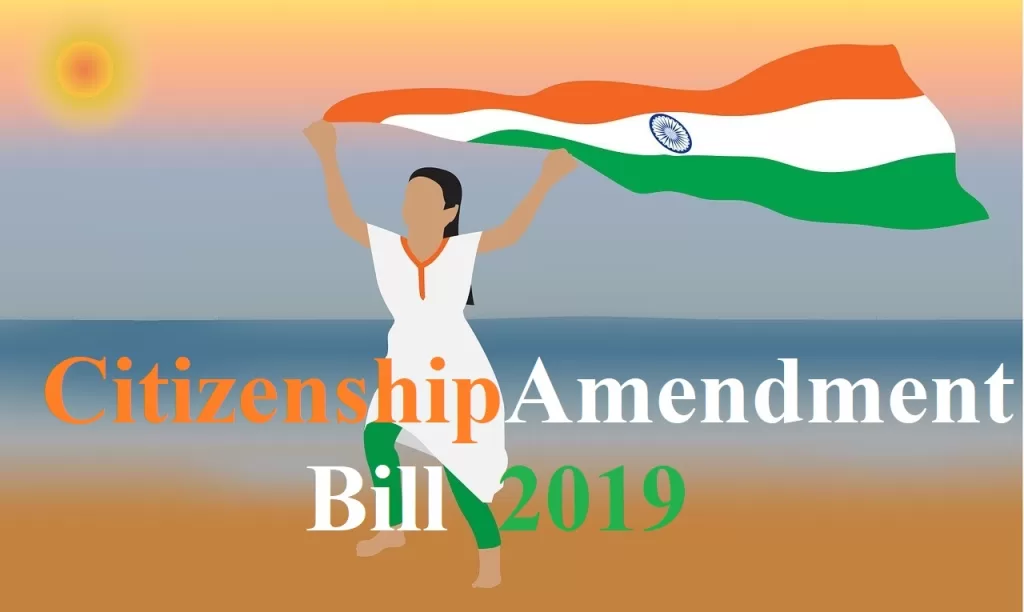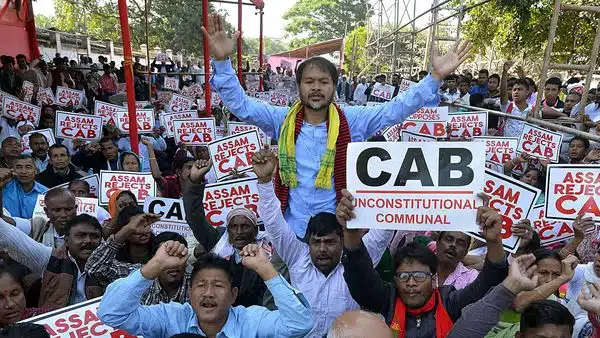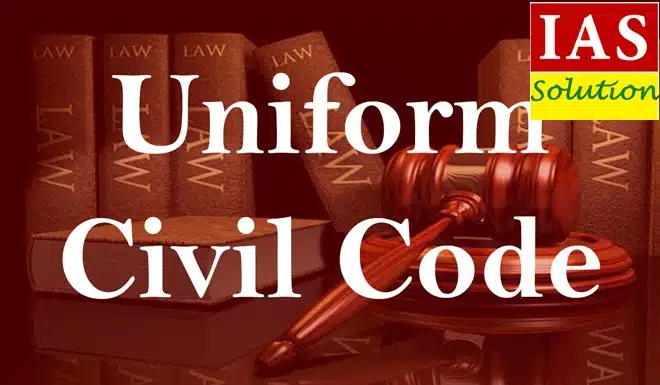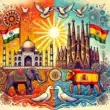Citizenship Amendment Bill (CAB) 2019 – All you need to know

What is Citizenship Amendment Bill (CAB) 2019?
Articles 5 to 11 {part II} of the Indian constitution confirms that whether a person is an Indian citizen or not. Citizenship Act 1955 is the legislation that governs this matter. The citizenship act 1955 was amended in 1986,1992,2003,2005 and 2015. The Citizenship Amendment Act 2019 is an amendment to the citizenship act 1955. By amending the Citizenship Act 1955, the CAB opens the door for Indian citizenship to religious minorities from Pakistan, Bangladesh, and Afghanistan. In other words, non -Muslims from the three nations will be granted citizenship.
Which political parties support Citizenship Amendment Bill and who all are against CAB?
The ruling Bharatiya Janatha Party supports CAB. Besides BJP, JD(U), JD,SAD,AIADMK, TDP and YSR- Congress were also in favor of CAB. On the other hand, the Indian national congress left parties (CPI,CPI(M)) had stringent oppositions for CAB. Shiv Sena however, did not participate in the
voting. In nutshell, 125 members supported CAB while 99 were against CAB.
Facts about Citizenship Amendment Bill 2019
Provision for Indian Citizenship
CAB proposes to grant citizenship to Hindus, Sikhs, Christians, Buddhists, Jains, and Parsis excluding Muslims from Afghanistan, Pakistan and Bangladesh. In order to gain citizenship, the above-mentioned communities from the three nations should have arrived India before December 31, 2014. In other words, CAB provides citizenship to millions of immigrants who are from the three states and belongs to the non-Muslim communities even without valid documents. It also states that immigrants who does not belong to the above-mentioned communities will be denied Indian Citizenship.
Relaxation to illegal migrants
Besides these, any illegal migrant from Pakistan, Afghanistan, and Bangladesh who belongs to the non-Muslim community will not be imprisoned or deported even though they lack valid documents.
Immigrant residency relaxation
Earlier, any immigrant who needs to obtain Indian Citizenship by naturalization should have resided in the country for 11 years. The CAB has reduced the residency status of immigrants from 11 years to 5 years. Similarly, immigrants who entered India before December 31,2014 from the three nations and who belongs to the mentioned communities are no longer treated as illegal immigrants.
Exemption of certain states and cardholders
The CAB exempts certain North-Eastern states from the provision. The Citizenship Amendment Bill does not apply to tribal areas of Assam, Meghalaya, Mizoram and Tripura. Because of the fact that these states are included in the Sixth Schedule of the Indian Constitution and the area covered under the Inner Limit notified under Bengal Eastern Frontier Regulation of 1974, certain North-Eastern states are exempted from CAB .It is therefore evident that Arunachal Pradesh, Nagaland and Mizoram along with parts of Assam, Tripura and almost whole of Meghalaya may stay out from the influence of CAB.
Inner Line Permit (ILP)
The Inner Line Permit was introduced in 1873. The Bengal Eastern Frontier Regulation introduced the ILP for border areas. In ILP, people outside the areas are allowed only to visit such areas only if they have a permit. Further, the outsiders cannot settle in such areas with ILP. The ILP is now used in these areas to protect from the purview of CAB. Amendments in provisions related to OCI Cardholders Besides exemption of certain states from CAB, the bill also has amendments to the provisions provided to OCI cardholders. Under the citizenship act of 1955, a foreigner can register as OCI if they are of Indian origin. For example, former citizens of India or their descendants or spouse of a person of Indian origin can entitle for OCI as per the citizenship bill. But according to the CAB, it amends to cancel OCI registration if the person has violated any law notified by the central government. The violations include
showing disaffection to the Constitution, engaging with the enemy during the war, necessity in the interest of sovereignty of India, security of state or public interest, or if within five years of registration the OCI has been sentenced to imprisonment for two years or more
What is Article 14 and is it violated in Citizenship Amendment Bill 2019?
Article 14 of our constitution guarantees equal rights to all people which include citizens and foreigners. However, it permits to differentiate between groups of people if rationale for doing so is a reasonable purpose. Hence, it is evident that the amendment clearly violates article 14 of Indian Constitution on various grounds. These include:
1. The CAB provides differential treatment to illegal migrants on the basis of
their country of origin
2. It provides differential treatment on religious basis.
3. Differential approach in relation to their entry to Indian land.
4. Differential treatments in relation to place of residence in India.
Also read: Plasma Therapy and Plasma Bank – All you need to Know
Whether the four differentiating factors are for reasonable purpose?
Firstly, the bill includes illegal migrants from Afghanistan, Pakistan and Bangladesh only. The statement of objects and Reasons in the bill states that India has long history of migration from these three countries. Moreover, these nations has a state religion and therefore, resulting in persecution of religious minorities. Further, statement of Objects andReasons (SoR) explains that millions of citizens of undivided India were living in Pakistan and Bangladesh. However, it failed to explain about the inclusion of Afghanistan.
Failure to provide a reasonable explanation about the exclusion of Sri Lanka and Myanmar
Furthermore, the question arises when other neighboring countries are excluded from the CAB. In addition, SoR failed to explain about such an exemption. For example, neighboring Sri Lanka has a long history of linguistic minority persecution (the Tamil Eelams). Similarly, Myanmar a country that India shares a border has history of religious persecution (the Rohingya Muslims). The bill clearly explains that it is aimed to attain citizenship to people who faces religious persecution. However, it is unclear why religious minorities
from these states are avoided. Thus, the bill is a clear violation of article 14 of the Indian Constitution.
How the bill violates Article 14 on religious basis?
Secondly, it is unclear that’s why only illegal migrants from six religious groups have included in the bill. For instance, for many years there are persecutions towards Ahmadiyya Muslims in Pakistan and they are excluded from the bill. The Ahmmadiyya Muslims are not considered as Muslims in Pakistan. Likewise, in Bangladesh, there is a murder of atheists is still in practice. Avoidance of such groups is also a clear violation of article 14.
Date of entry to India
Thirdly, the bill fails to explain why there is a differential treatment towards illegal migrants who entered the country on different dates. In other words, whether they entered the country before or after December31,2014.
Why there are protests taking place across the country?

Image Courtesy: Google
There are widespread protests across the country against the CAB. But the protests have different reasons in different parts of the country. In other words, there is no uniqueness in the protests. For instance, the protests in the North Eastern states have one reason and the rest of India haveanother reason.
Also read – Advantages and disadvantages of One Nation One Election System
The reason behind Assam Protest
People in most parts of Assam fear that CAB lead to mixing of indigenous communities in Assam. This is because according to CAB it allows lakhs of Hindus from Bangladesh to gain Indian citizenship. Thus, it causes a burden on their resources, posing a threat to the Assamese language, culture and tradition. However, the Bengali speakers who dominate Barak Valley are in favor of CAB.
Further, the protesters in Assam argue that it violates the Assam Accord. In addition to the violation of the Assam Accord, the protesters also argue that the state accepted millions of migrants from 1951 to 1971. While other states did not take in migrants during this period, hence it is unfair to impose more burdens on the state.
Assam Accord
From 1979 to 1985 there was Assam movement under the leadership of All Assam Students Union. The main aim was to deport all illegal migrants from Assam. The movement spread to all North Eastern states and ultimately it affected the whole nation. The massive and violent agitation resulted in the death of 885 people over the six year period. Finally, the movement ended after the signing of Assam Accord by the Central Government on August 15, 1985.
According to Assam Accord, the date of detention and deportation of illegal migrants were set as March 25,1971, whereas, for other state it was 1951. However, different governments came into power and all failed to implement Assam Accord. Eventually, in 2009, the honorable Supreme Court ordered to implement Assam Accord as there was an influx of nearly 40 lakhs of voters in the voters list. The court ordered for National Registry Of Citizens (NRC) in Assam.
NRC –National Registry Of Citizens
In view to deport foreigners, the National Registry Of Citizens was a promise made in Assam Accord. When NRC published it came into light that majority of migrants who denied citizenship was Hindus or indigenous tribes. Protesters argue that CAB will dismiss NRC and thereby awarding citizenship to illegal
migrants. However, the Asom Gana Parishad says that the clause 6 of Assam Accord can protect the state from the adverse effects of CAB.
Also read :EWS Reservation Eligibility
NRC and its relation to Citizenship Amendment Bill 2019
According to the Honorable Home Minister, the CAB and NRC are not linked. But in reality, both are interlinked. The NRC was to target illegal migrants in Assam. When the NRC data collection had completed in 2019, it came to know that the majority of illegal migrants belong to Hindu community. The Union Government do not want to deport the Hindu migrants and wanted to deport Muslim
migrants. Because of this reason the CAB was introduced without any amendment in constitution. If the government wants to implement CAB, nationwide NRC should be done. Then only the authorities can identify who are illegal migrants and who are Indian citizens. Hence, NRC and CAB are closely linked. Those who fail to produce sufficient documents as mentioned by the central government will not be provided with Indian Citizenship. Therefore, those people should go out of the country whereas illegal migrants will get citizenship on a religious basis.
Clause 6 of Assam Accord
Clause 6 of Assam Accord is in relation to constitutional, legislative and administrative safeguarding to protect, preserve and to promote the cultural, social, linguistic identity and heritage of the people of Assam.
Protests in other Indian States
In the rest of India, the protests are mainly due to communal nature of CAB. In other words citizenship is defined on the basis of religion. This, in turn, questions the secular nature of our country. This is the main reason for protest against CAB in different parts of the country. In addition to this, the CAB poses a threat to citizenship to all people of the country. Further, it is an issue that affects every citizen of the country. The implementation of CAB can take back to demonization period where people stood in long queues to change the money they have earned. Here, the only difference is that people will be standing in long queues to prove their citizenship. Furthermore, most of the people do not have valid documents to prove their citizenship will be deported from the country even if they are citizens. People were unaware about the importance of such documents in the past. In other words, people from the old generation may do not have valid documents to prove their citizenship which in turn results in loss of citizenship for the whole family. Unfortunately, most of the Indian population is unaware of the aftermaths of the CAB and violation of our constitution.
Conclusion
In conclusion, as a responsible citizen of the country, we should create awareness about the aftermath of this bill and every step should be made to protect our constitution. In nutshell, the bill violates the constitution and put a threat to people’s life and property. Therefore, every step should be made to create awareness among the public about these aspects.










Leave a Reply